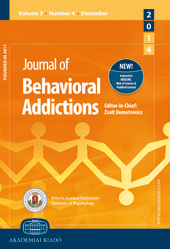Proactive Coping and Gambling Disorder Among Young Men
Proactive Coping and Gambling Disorder Among Young Men
Author(s): Pawel Sleczka, Barbara Braun, Bettina Grüne, Gerhard Bühringer, Ludwig KrausSubject(s): Gender Studies, Cognitive Psychology, Behaviorism, Substance abuse and addiction, Social Informatics
Published by: Akadémiai Kiadó
Keywords: gambling disorder; young adults; men; proactive coping; impulsiveness; social support;
Summary/Abstract: Male sex, young age, and frequent gambling are considered as risk factors for gambling disorder (GD) and stress might be one of the triggers of gambling behavior among problem gamblers. Conversely, well-developed coping with stress might counteract gambling problems. The Proactive Coping Theory provides a promising approach for the further development of preventive and treatment measures. The objective of the study was to investigate different facets of proactive coping (PC) in young male gamblers. Methods: Young men from Bavaria were recruited via the Munich citizens’ registry (n = 2,588) and Facebook invitations (n = 105). In total, 173 out of 398 individuals were positively screened for frequent gambling and/or signs of related problems and completed the baseline questionnaire of the Munich Leisure-time Study. Factors investigated include gambling problems, PC, impulsiveness, social support, and psychological distress. Results: Gambling problems were associated with lower levels of preventive coping as well as of adaptive reaction delay. The associations were also significant when controlled for impulsiveness and general psychological distress. Preventive coping moderated the association between social support and gambling problems. Discussion and conclusions: Young men with gambling problems less frequently prevent the occurrence of stressors and more often react hasty when these occur. While the investigated group reported good social support, this factor was negatively associated with GD only among individuals with good preventive coping. Preventive coping poses a useful construct for selective prevention and treatment as it can be modified in professional interventions.
Journal: Journal of Behavioral Addictions
- Issue Year: 5/2016
- Issue No: 4
- Page Range: 639-648
- Page Count: 10
- Language: English

